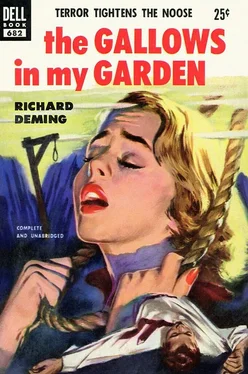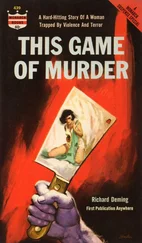Richard Deming - Gallows in My Garden
Здесь есть возможность читать онлайн «Richard Deming - Gallows in My Garden» весь текст электронной книги совершенно бесплатно (целиком полную версию без сокращений). В некоторых случаях можно слушать аудио, скачать через торрент в формате fb2 и присутствует краткое содержание. Город: New York, Год выпуска: 1953, Издательство: Dell, Жанр: Крутой детектив, на английском языке. Описание произведения, (предисловие) а так же отзывы посетителей доступны на портале библиотеки ЛибКат.
- Название:Gallows in My Garden
- Автор:
- Издательство:Dell
- Жанр:
- Год:1953
- Город:New York
- ISBN:нет данных
- Рейтинг книги:5 / 5. Голосов: 1
-
Избранное:Добавить в избранное
- Отзывы:
-
Ваша оценка:
- 100
- 1
- 2
- 3
- 4
- 5
Gallows in My Garden: краткое содержание, описание и аннотация
Предлагаем к чтению аннотацию, описание, краткое содержание или предисловие (зависит от того, что написал сам автор книги «Gallows in My Garden»). Если вы не нашли необходимую информацию о книге — напишите в комментариях, мы постараемся отыскать её.
Actually, Moon got off one of the fastest snap-shots in history, and went on to wrap up the case for the most beautiful client he ever had.
Gallows in My Garden — читать онлайн бесплатно полную книгу (весь текст) целиком
Ниже представлен текст книги, разбитый по страницам. Система сохранения места последней прочитанной страницы, позволяет с удобством читать онлайн бесплатно книгу «Gallows in My Garden», без необходимости каждый раз заново искать на чём Вы остановились. Поставьте закладку, и сможете в любой момент перейти на страницу, на которой закончили чтение.
Интервал:
Закладка:
After dinner another group conclave was held, during which it was again decided Grace should leave the house. Grace, subdued by her experience in the pool, sick to her stomach and with a throbbing headache, offered no resistance to anything.
“Since you all know Grace was at El Patio before,” I told the group, “there isn’t much point in trying to conceal she’s going back there. I’m inclined to agree with Arnold Tate that since his announcement of the secret marriage, there will be no further attempts on Grace’s life. But I have no intention of taking chances. For the benefit of whichever one of you it applies to, there is only one stairway to the upper floor at El Patio. Mr. Greene here will be at the top of it all night with a cocked pistol, so if you have any urgent reason to talk to Grace, phone her. There’s a phone in the apartment listed under Miss Moreni’s name.”
Leaving them with this cheerful information, we returned to El Patio in Mouldy Greene’s convertible. We arrived about eight o’clock, the hour Fausta usually began floating from table to table greeting customers. But tonight she was in no condition to play the charming hostess. She and Grace retired together, locking the apartment door from inside.
I helped Mouldy set up a folding cot across the doorway to Fausta’s apartment, watched while he made it up and tucked his automatic under the pillow, and gave him some final instructions before leaving him.
“I’ll be back at eight in the morning,” I told him. “Until then Grace stays in that apartment even if you have to tie her. Don’t let anyone in, and don’t let her out for any reason.”
“Suppose we have a fire?”
I contemplated him moodily. “Just puncture your head and let the water spurt on the flames.”
On the surface it might have seemed moronic to leave Grace’s protection in the hands of Mouldy Greene, but his single efficiency was acting as a sentry. In the army I learned that once Greene understood his assignment, nothing on earth could get past him to whatever he was guarding. His only trouble was lack of imagination, and once in Ireland he nearly shot the pants off a brigadier general who insisted on walking across the grass in front of the captain’s orderly room.
We were quartered in British barracks at the time, and the lawn in front of the orderly room had just been freshly sodded. As first sergeant I asked the officer of the day if he would have the sentry on that post keep people off the grass in addition to his regular instructions. Mouldy drew that particular post, and to Mouldy an order was an order.
Only the fact that Greene could not hit a Tiger tank at ten yards with a rifle prevented us from having a dead general on our hands. And only the fact that Private Marmaduke Greene was already classified as a basic, which is as low as you can get in the army, prevented the captain from reducing him the minute the general ran out of words and removed his singed pants from the area.
Therefore, while it was entirely possible I might find a dead cleaning-woman in the upper hall when I returned to El Patio, I was reasonably certain Grace Lawson was safe.
In the city directory at the bar downstairs I found Vance Logan listed at apartment 217 of the Grand Towers. The address struck me as rather peculiar for an ex-chauffeur, since the Grand Towers is an apartment hotel catering almost exclusively to the wealthy.
The directory indicated he had a single-party phone, but since I preferred to walk in on him unannounced before he had time to mull over what I might want with him, I skipped phoning in advance.
A taxi took me to the Grand Towers. I had the driver park in the nearest vacancy to the entrance, about a quarter of a block away, and told him to wait.
The Towers is one of those residential hotels with a small but expensively furnished lobby and a call desk behind which no one ever seems to be on duty. A buzzer with a mother-of-pearl button was mounted at one end of the desk, presumably for the summoning of the manager in case you happened to want to rent a three-hundred-dollar-a-month apartment.
I walked past the buzzer, past a self-service elevator, and climbed the stairs to the second floor. Here I found a long hallway of oak paneling, floored with a gray carpet about as thick as the mattress on my bed. I waded through the nap of the carpet to a door marked 217.
I had my choice of a bronze door knocker in the shape of a lion’s head, or another mother-of-pearl button. I tried the button first, thought I heard faint chimes, but could not be sure. When nothing happened after nearly a minute, I reached for the knocker.
As I thrust my fingers against the lion’s nose, his head moved away from me slightly. I glanced sidewise and saw my movement had pushed the door open a crack. Abandoning the knocker, I tried the button again and this time heard the chimes distinctly.
When no one answered after two more tries, I pushed the door open the rest of the way and looked in. It was not yet quite dark but heavy draperies were pulled across the three windows opposite me. Two floor lamps were on in the front room, and by their light I could see the apartment was furnished in accordance with the high rent charged.
It was also furnished with a corpse.
He wore a blue dressing-gown and he sat in a deep armchair facing the door. An untouched highball in which the ice had long ago melted stood on an end table next to his chair. I judged him to have been in his early thirties, and he would not have been bad-looking if there had been a top to his head.
Closing the door with my elbow, I made a tour of the whole apartment without touching anything. It contained a bedroom, bath, kitchenette, and dinette in addition to the front room, and no murderers were hiding in any of them. Back in the front room I stooped to examine the gun clutched in the dead man’s right hand. It was a P-38.
Grasping his dressing-gown sleeve, I gently pulled his arm away from the side of the chair until the light fell on the gun’s serial number. I recognized the number because it was my P-38.
Using my handkerchief, I used the apartment’s phone to call Warren Day’s flat.
“Listen, Moon,” he greeted me. “I got office hours, and nine at night isn’t one of them. Whose body you got this time?”
“I’m not sure,” I said. “But I think his name is Vance Logan.”
For a moment there was silence. “You mean you really got a body?” he asked finally. “You’re not just trying to be funny?”
“I really got one,” I assured him.
“Judas Priest!” he exploded. “Why don’t you stay home nights?”
“I’m at apartment two-seventeen of the Grand Towers,” I told him. “The apartment is listed under Vance Logan, who was chauffeuring Donald Lawson Senior about a year ago when Lawson was killed in an auto accident. If this guy is Vance Logan, he is supposed to have committed suicide because he’s got a gun in his hand. The only catch is the gun belongs to me, and is the one I reported heisted by Harry the Horse and Dude Garrity.”
“I’ll be right over,” he said wearily. “Don’t touch anything.”
“I hadn’t intended to,” I said shortly, and hung up.
The police arrived with sirens wide open and a callous disregard for the nervous system of the fat hotel manager, who popped out of the wall some place the minute Warren Day walked into the room. To say the manager was horrified would be an understatement. He seemed to think the murder was a deliberate plot by the police to destroy his hotel’s reputation, and I got the impression his solution to the killing would have been to drop the body in the river and forget the whole thing.
“I knew I should have asked that man for references!” he wailed when he saw the corpse.
Читать дальшеИнтервал:
Закладка:
Похожие книги на «Gallows in My Garden»
Представляем Вашему вниманию похожие книги на «Gallows in My Garden» списком для выбора. Мы отобрали схожую по названию и смыслу литературу в надежде предоставить читателям больше вариантов отыскать новые, интересные, ещё непрочитанные произведения.
Обсуждение, отзывы о книге «Gallows in My Garden» и просто собственные мнения читателей. Оставьте ваши комментарии, напишите, что Вы думаете о произведении, его смысле или главных героях. Укажите что конкретно понравилось, а что нет, и почему Вы так считаете.












